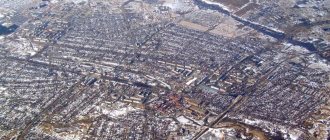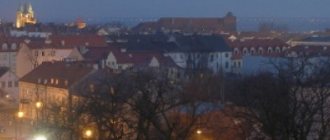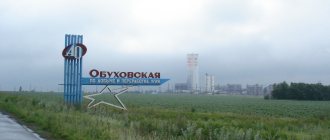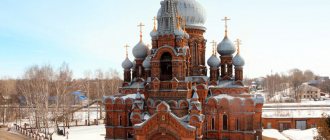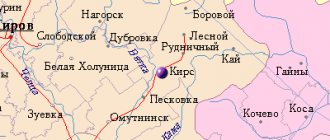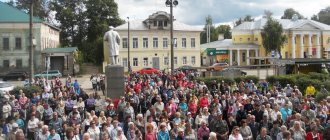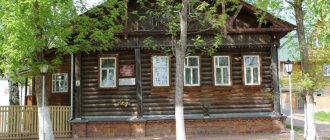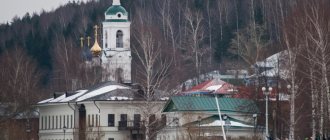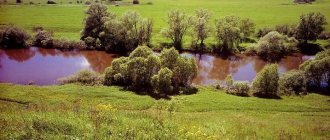This term has other meanings, see Yuzha (village).
| City Yuzha A country
| |||||||||||||||||||||||||||||||
| Yuzha Moscow |
| Ivanovo Yuzha |
K: Settlements founded in 1628
Yuzha
- a city (since 1925[2]) in Russia, the administrative center of the Yuzhsky district of the Ivanovo region.
Population - 13,019[1] people. (2016).
The municipal formation of the urban settlement of Yuzhskoye, the administrative center of which is the city of Yuzha, is included in the list of single-industry municipalities of the Russian Federation (monocities) in the category of municipalities with the most difficult socio-economic situation (including in connection with the problems of the functioning of city-forming organizations)[3 ].
Story
In 1556, in the charter of the Pozharsky princes to Archimandrite Mikhail of the Suzdal Spaso-Evfimiev Monastery, the “Southern Frontier” is mentioned. In the middle of the 16th century, the area was known as the “Yuzha settlement”. In 1645, Yuzha was listed as the estate of Nikifor Yuryevich Pleshcheev, a descendant of an old Moscow boyar family. Later it belonged to representatives of the Opochnin and Naryshkin families.
Since 1859, the village of Yuzha was in the possession of the Vyaznikovsky landowner Ivan Protasyev, who decided to build a cotton factory there. In 1860, the first three-story building of a paper spinning mill was built on the shores of Lake Vasal. In 1865, the factory was purchased by the Shuya merchant Asigkrit Balin and subsequently became known as the “Balin Factory” or “Yuzhskaya Manufactory”. When purchased, the factory had 13,776 spinning spindles; twenty years later, in 1885, the factory had 50,136 spinning spindles and 120 weaving machines - from a paper spinning mill it turned into a spinning and weaving mill [4] [5].
In the 1860-1890s, multi-story red brick factory buildings (spinning and weaving), as well as warehouses, were built. By the beginning of the 20th century, Yuzha was a large working settlement.
After the end of the Soviet-Finnish war, the Finnish side handed over 5.5 thousand military personnel who were captured to the Soviet military authorities. All of them were sent to a special camp created in Yuzha. The camp, surrounded by barbed wire, was guarded by NKVD escort troops. Prisoners there were deprived of the right to correspondence and visits with family and friends. The location was kept strictly secret. The check lasted almost a year. A significant part was convicted. Those who remained were taken to the North in the spring of 1941. Their further fate is unknown[6].
A little-known town in the Ivanovo region: the city of Yuzha
Yuzha is a small town in the Ivanovo region, 100 km from the regional center. It takes about 2 hours to drive from Ivanovo, and quite recently a road was built here all the way to Yuzha - getting around by car is a pleasure.
Current
- A Hermitage employee licked a find from the dress of Nicholas II’s sister
- Eating snow in an ice hole: foreigners are shocked by Russian tiktoker
- Rare deep-sea fish found on US beach
We found golden autumn in Yuzha. In 2021, this period occurred in the first half of October. Below in the photo is a dawn reflection of an autumn forest in the water of Lake Vasal.
The name of the city comes from the Finno-Ugric word “uzha” - which means the far corner or wedge of the forest; there is also a second version of the name from the word “yuzga” - meaning swamp, swamp. Indeed, the southern region is a land of numerous lakes, peat bogs and dense forests.
The city is located on the shores of a “man-made lake” - the Vasal reservoir.
The first documentary evidence of Yuzha as a settlement dates back to the middle of the 16th century. Only in 1925 the settlement received city status.
The city has preserved the infrastructure of a workers' village at a 19th-century factory. The main architectural dominant is the weaving factory buildings.
Other attractions include the almshouse building (15 Sovetskaya Street). Now it houses a children's and youth center. It should be noted that the building is in very good condition, almost all architectural elements have been preserved or restored.
Nearby on the street there is another interesting building, the “People's House” at the weaving factory (Sovetskaya Street, building 9), architect Gustav Gelrich, a master of Moscow Art Nouveau. Now the building houses the Southern District House of Culture.
Sovetskaya Street is the main street of the city, passing through it. It is very convenient to walk from the House of Culture to the lake, then turn to the main square, to the secondary streets with incredibly beautiful platbands on the houses. You may meet other locals who will be no less interested in you.
If you have time, you can go to neighboring Kholui, famous for its lacquer miniatures. The village is located just 10 km from Yuzha. The road to get there is incredibly beautiful, with numerous turns and villages along the way. Unfortunately, some of them are half abandoned.
In Kholuy, a must-see is the museum of lacquer miniatures; you can also take a leisurely stroll along the Teza River, see the temple complex, numerous houses with platbands and be amazed at the extraordinary hospitality of the local residents.
The city of Yuzha became a discovery of the Ivanovo region. There are almost no tourists there, which is partly what makes it attractive. And of course, its history, architecture, atmosphere and identity.
Notes
- ↑ 123
www.gks.ru/free_doc/doc_2016/bul_dr/mun_obr2016.rar Population of the Russian Federation by municipalities as of January 1, 2021 - THE USSR. Administrative-territorial division of the union republics on January 1, 1980 / Compiled by V. A. Dudarev, N. A. Evseeva. - M.: Publishing house "Izvestia of the Soviets of People's Deputies of the USSR", 1980. - 702 p. — P. 122.
- Order of the Government of the Russian Federation dated July 29, 2014 No. 1398-r
- ↑ 12
[yuzha.ru/investments/visitnaj_kartochka.html Official website of the Yuzhsky municipal district of the Ivanovo region History of the region]. - [www.old-yuzha.ru/history_yuzha.html Website of the Temple of the Smolensk Icon of the Mother of God in Old Yuzha History of the Yuzha region].
- [kopilka.wolfschanze.ru/naumov.pdf The fate of prisoners of war and deported citizens of the USSR. Materials of the Commission for the Rehabilitation of Victims of Political Repression] // New and recent history: journal. - 1996. - No. 2. - P. 92.
- ↑ 12345678910111213
www.MojGorod.ru/ivanovsk_obl/juzha/index.html People's encyclopedia “My City”. Yuzha - [demoscope.ru/weekly/ssp/rus59_reg2.php All-Union Population Census of 1959. The size of the urban population of the RSFSR, its territorial units, urban settlements and urban areas by gender] (Russian). Demoscope Weekly. Retrieved September 25, 2013. [www.webcitation.org/6GDOghWC9 Archived from the original on April 28, 2013].
- [demoscope.ru/weekly/ssp/rus70_reg2.php All-Union Population Census of 1970 The size of the urban population of the RSFSR, its territorial units, urban settlements and urban areas by gender.] (Russian). Demoscope Weekly. Retrieved September 25, 2013. [www.webcitation.org/6GDOiMstp Archived from the original on April 28, 2013].
- ↑ 123
[ivanovo.gks.ru/wps/wcm/connect/rosstat_ts/ivanovo/resources/4ce371004da3f783837cf741cd117b4b/itogi_vpn2010_table_volume_1.pdf Results of the 2010 All-Russian Population Census, volume 1. Number and distribution of the population of the Ivanovo region]. Retrieved August 8, 2014. [www.webcitation.org/6Rfo0NidC Archived from the original on August 8, 2014]. - [www.perepis2002.ru/ct/doc/1_TOM_01_04.xls All-Russian Population Census 2002. Volume. 1, table 4. Population of Russia, federal districts, constituent entities of the Russian Federation, districts, urban settlements, rural settlements - regional centers and rural settlements with a population of 3 thousand or more]. [www.webcitation.org/65AdCU0q3 Archived from the original on February 3, 2012].
- [www.gks.ru/bgd/regl/B09_109/IssWWW.exe/Stg/d01/tabl-21-09.xls Number of permanent population of the Russian Federation by cities, urban-type settlements and districts as of January 1, 2009]. Retrieved January 2, 2014. [www.webcitation.org/6MJmu0z1u Archived from the original on January 2, 2014].
- [www.gks.ru/free_doc/doc_2012/bul_dr/mun_obr2012.rar Population of the Russian Federation by municipalities. Table 35. Estimated resident population as of January 1, 2012]. Retrieved May 31, 2014. [www.webcitation.org/6PyOWbdMc Archived from the original on May 31, 2014].
- [www.gks.ru/free_doc/doc_2013/bul_dr/mun_obr2013.rar Population of the Russian Federation by municipalities as of January 1, 2013. - M.: Federal State Statistics Service Rosstat, 2013. - 528 p. (Table 33. Population of urban districts, municipal districts, urban and rural settlements, urban settlements, rural settlements)]. Retrieved November 16, 2013. [www.webcitation.org/6LAdCWSxH Archived from the original on November 16, 2013].
- [www.gks.ru/free_doc/doc_2014/bul_dr/mun_obr2014.rar Table 33. Population of the Russian Federation by municipalities as of January 1, 2014]. Retrieved August 2, 2014. [www.webcitation.org/6RWqP50QK Archived from the original on August 2, 2014].
- [www.gks.ru/free_doc/doc_2015/bul_dr/mun_obr2015.rar Population of the Russian Federation by municipalities as of January 1, 2015]. Retrieved August 6, 2015. [www.webcitation.org/6aaNzOlFO Archived from the original on August 6, 2015].
- [yuzha.ru/obrazobanie/shkola3.html Municipal secondary school No. 3]. Official website of the Yuzhsky municipal district of the Ivanovo region. Retrieved December 26, 2010. [www.webcitation.org/61GGnAcm1 Archived from the original on August 28, 2011].
Official tourism portal of the Ivanovo region
My native city in front of me He is friends with my heart Everywhere they are, the lights of Little quiet Yuzha are shining I. Ganabin Yuzhsky district is a land of clear lakes, peat bogs, dense forests: dense spruce groves, light birch groves. The very name of our land as the “Southern Frontier” is mentioned in the charter of the Pozharsky princes to the Spaso-Evfimiev Suzdal Monastery in 1556/57, and by some researchers it is derived from the word “yuzga”, which means swamp. Indeed, the area adjacent to the winding Lukh at its confluence with the Klyazma is very swampy. Perhaps this is a name of Finno-Ugric origin, the meaning of which is unlikely to be restored. The lands of the region are included in the interfluve of the Volga and Oka, where in the 6th - 19th centuries. Slavic colonization of territories inhabited by numerous Finno-Ugric tribes took place, from which many place names have been preserved: Yuzha, Teza, Klyazma, Kshhara, Cheremisino, etc. In the 14th century. the current southern lands were part of the Starodub principality, and during its division they formed the Ryapolovsky inheritance with its center in the ancient village of Ryapolovo. Since the 15th century these lands were already part of the united Russian state. In the Yuzhsky district there were patrimonial lands of the Pozharsky princes, descendants of the Starodub princes. It was to the Mugreevo estate, where Prince Dmitry Mikhailovich Pozharsky was healing his wounds, that an embassy arrived from Nizhny Novgorod, asking the prince to lead the campaign of the people's militia against Moscow, which ended on October 27, 1612 with the liberation of Moscow from the Polish conquerors. In the town of Borok, where the people's militia stopped, and in the village of Mugreevo-Nikolskoye, memorial signs were erected in honor of the liberator of Moscow, Prince D.M. Pozharsky. According to the will of the prince, Nikolskaya Borkovskaya hermitage was founded by his son in the town of Borok in 1612. The Teza River is known as an ancient trade route. Five wooden locks, cut down in the mid-19th century, which ensured navigation along it, still survive. The idea of creating this lock system belongs to Peter the Great, who visited Shuya in 1722 and immediately appreciated the prospects of Teza as a water trade route. Yuzha provides a striking example of transformation in the second half of the 19th – early 20th centuries. through the efforts of the Balin merchants, an ancient patrimonial village was transformed into an ancient textile factory village, which is a rare urban planning complex in terms of compositional integrity, combining industrial, residential and estate zones around the man-made Lake Vasal. This village is one of the most impressive examples of the implementation of the idea of a garden city and a comprehensive solution to social problems in the conditions of pre-revolutionary Russia.
In 1922, Yuzha was transformed from a village into an urban-type settlement, and on June 6, 1925 it received city status. The Yuzhskaya Land has many facets that make it potentially attractive to both domestic and foreign tourists. It is called Central Russian or Ivanovo Karelia, because there are about 100 lakes in it, picturesque, exceptionally interesting for their flora and fauna. About 40 km away is Lake Svyatoe, with an area of almost 300 hectares, exceptionally clean, well-warmed with high biodiversity and picturesque surroundings. This is a wonderful recreational area for children and adults. On the shore of the lake there is an actively developing convent, inheriting the traditions of the Svyatozersk Iverskaya Hermitage that was on this site, as well as a children's health camp. Lyulekh, Teza, Klyazma are ecologically clean rivers that provide a combination of beautiful nature, picturesque landscapes and famous ancient villages located on the banks, including Palekh, Khotiml, Kholui, as well as a protected area for tourist kayakers - unusually flowing, with a wide the glacial valley of the Lukh River, carrying its waters to Klyazma. The Yuzhsky region is very attractive for lovers of hunting and fishing.
Excerpt characterizing Yuzh
- Sovereign! Sovereign! - suddenly echoed through the halls, and the entire crowd rushed to the exit. Along a wide passage, between the wall of nobles, the sovereign walked into the hall. All faces expressed respectful and frightened curiosity. Pierre stood quite far away and could not fully hear the sovereign’s speeches. He understood only from what he heard that the sovereign was talking about the danger in which the state was, and about the hopes that he placed in the Moscow nobility. Another voice answered the sovereign, reporting about the decree of the nobility that had just taken place. - Gentlemen! - said the sovereign’s trembling voice; the crowd rustled and fell silent again, and Pierre clearly heard the sovereign’s so pleasantly human and touched voice, which said: “I have never doubted the zeal of the Russian nobility.” But on this day it exceeded my expectations. I thank you on behalf of the fatherland. Gentlemen, let us act - time is most valuable... The Emperor fell silent, the crowd began to crowd around him, and enthusiastic exclamations were heard from all sides. “Yes, the most precious thing is... the royal word,” said the sobbing voice of Ilya Andreich from behind, who heard nothing, but understood everything in his own way. From the hall of the nobility the sovereign went into the hall of the merchants. He stayed there for about ten minutes. Pierre, among others, saw the sovereign leaving the merchants' hall with tears of tenderness in his eyes. As they later learned, the sovereign had just begun his speech to the merchants when tears flowed from his eyes, and he finished it in a trembling voice. When Pierre saw the sovereign, he went out, accompanied by two merchants. One was familiar to Pierre, a fat tax farmer, the other was a head, with a thin, narrow beard, yellow face. They both cried. The thin man had tears in his eyes, but the fat farmer wept like a child and kept repeating: “Take both life and property, Your Majesty!” Pierre no longer felt anything at that moment except the desire to show that he didn’t care about anything and that he was ready to sacrifice everything. His speech with a constitutional direction appeared to him as a reproach; he was looking for an opportunity to make amends for it. Having learned that Count Mamonov was donating the regiment, Bezukhov immediately announced to Count Rostopchin that he was giving up a thousand people and their contents. Old man Rostov could not tell his wife what had happened without tears, and he immediately agreed to Petya’s request and went to record it himself. The next day the sovereign left. All the assembled nobles took off their uniforms, again settled in their houses and clubs and, grunting, gave orders to the managers about the militia, and were surprised at what they had done. Napoleon started the war with Russia because he could not help but come to Dresden, could not help but be overwhelmed by honors, could not help but put on a Polish uniform, could not succumb to the enterprising impression of a June morning, could not refrain from an outburst of anger in the presence of Kurakin and then Balashev. Alexander refused all negotiations because he personally felt insulted. Barclay de Tolly tried to manage the army in the best possible way in order to fulfill his duty and earn the glory of a great commander. Rostov galloped to attack the French because he could not resist the desire to gallop across a flat field. And so exactly, due to their personal properties, habits, conditions and goals, all those innumerable persons who took part in this war acted. They were afraid, they were conceited, they rejoiced, they were indignant, they reasoned, believing that they knew what they were doing and that they were doing it for themselves, and all were involuntary instruments of history and carried out work hidden from them, but understandable to us. This is the unchangeable fate of all practical figures, and the higher they stand in the human hierarchy, the more free they are. Now the figures of 1812 have long since left their places, their personal interests have disappeared without a trace, and only the historical results of that time are before us. But let’s assume that the people of Europe, under the leadership of Napoleon, had to go deep into Russia and die there, and all the self-contradictory, senseless, cruel activities of the people participating in this war become clear to us. Providence forced all these people, striving to achieve their personal goals, to contribute to the fulfillment of one huge result, about which not a single person (neither Napoleon, nor Alexander, nor even less any of the participants in the war) had the slightest aspiration. Now it is clear to us what was the cause of the death of the French army in 1812. No one will argue that the reason for the death of Napoleon’s French troops was, on the one hand, their entry at a late time without preparation for a winter campaign deep into Russia, and on the other hand, the nature that the war took on from the burning of Russian cities and the incitement of hatred towards the enemy in the Russian people. But then not only did no one foresee that (which now seems obvious) that only in this way could the army of eight hundred thousand, the best in the world and led by the best commander, die in a clash with the Russian army, which was twice as weak, inexperienced and led by inexperienced commanders; not only did no one foresee this, but all efforts on the part of the Russians were constantly aimed at preventing the fact that only one could save Russia, and on the part of the French, despite the experience and so-called military genius of Napoleon, all efforts were directed towards this to stretch out to Moscow at the end of summer, that is, to do the very thing that should have destroyed them. In historical works about 1812, French authors are very fond of talking about how Napoleon felt the danger of stretching his line, how he was looking for a battle, how his marshals advised him to stop in Smolensk, and give other similar arguments proving that it was already understood there was danger of the campaign; and Russian authors are even more fond of talking about how from the beginning of the campaign there was a plan for the Scythian war to lure Napoleon into the depths of Russia, and they attribute this plan to some Pfuel, some to some Frenchman, some to Tolya, some to Emperor Alexander himself, pointing to notes, projects and letters that actually contain hints of this course of action. But all these hints of foreknowledge of what happened, both on the part of the French and on the part of the Russians, are now exhibited only because the event justified them. If the event had not happened, then these hints would have been forgotten, just as thousands and millions of opposing hints and assumptions that were in use then, but turned out to be unfair and therefore forgotten, are now forgotten. There are always so many assumptions about the outcome of every event that takes place that, no matter how it ends, there will always be people who will say: “I said then that it would be like this,” completely forgetting that among the countless assumptions, completely opposite.
